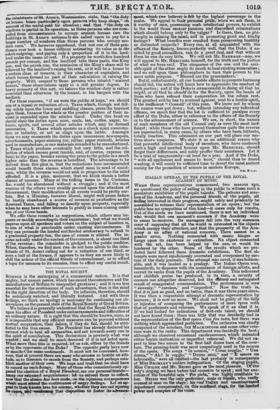ITALIAN OPERAS, BY THE PUPILS OF THE ROYAL • ACADEMY
OF MUSIC.
WHEN these representations commenced, two seasons ago, we questioned the policy of calling in the public to witness such a premature exhibition of the pupils talents. The patrons and mas- ters of the Academy, and the personal -friends of, the 'Pupils, all leering interested in their progress, might safely and prudently be assembled to witness their representation, of an opera ; but the public has no sympathies of this kind—it cares only for results. Out of the circle we have mentioned, there is not an individual who would feel one moment's concern if the Academy were to cease to-morrow. Its managers fall into the very, common error of supposing that all the world is interested in the objects which occupy their attention, and that the prosperity of the Aca- demy is an affair. of national concern. There cannot be a. greater error. Nothing connected with music hinges or hangs upon -its existence or extinction. No object connected with the art, has been helped by the one, or would be- hindered by the other. Some of the results which we pre- dicted have followed these dramatic exhibitions. The first at- tempts were most injudiciously overrated and overpraised by cer- tain of the daily journals. The attempt was novel, it was fashion- able, and it was lauded as a prodigy. The Italian Opera was, henceforth, to dispense with the assistance of foreign artists, and . recruit its ranks from the pupils of the Academy. This indiscreet and childish praise has produced, in its turn, a severity of censure not altogether deserved, but the ifttural and anticipated result of exaggerated commendation. The performance is now "slovenly," "careless," and "imperfect." Now the truth is, that it is just as good, and no better, than it was three years since. It was then a respectable attempt at dramatic representation by learners ; it is now no more. We shall not be guilty of the folly or injustice of comparing the performance of mere tyros with that of proficients and veterans. We speak of it as what it is. If we had looked for indications of first-rate talent, we should not have found them : there was little that was decidedly bad in the representation of the first opera Con i fan tulle, but there was nothing which approached perfection. The orchestra was chiefly composed of the scholars, but MACKINTOSH and some other vete- rans were in the ranks. This department was decidedly the best; although we observed occasional caxelessnesses, which indicated either boyish inattention or imperfect rehearsal. We did not ex- pect to hear two errors in the first half dozen bars of the over- ture. The pruning-knife was most unsparingly used in the course of the opera. The songs "In uomini," "Come aeoglio," "Una donna,' " Ah ! lo veggio," "'Donne miei," and "E amore un ladroncello," were all omitted—the last probably in consequence of Miss BROMLEY'S sudden indisposition. Of the singing 'pupils, Miss CHILHE and Mr. BRIZZI gave us the most pleasure. Of the lady's singing we. have before had occasion to speak; and her exe- cution of -the beautiful aria" Per pieta," was highly creditable to her. Raiz= was the only performer, male or female, Who really seemed-at ease on the stage; his rad-Italian and- unembarrassed deportment compensated, on this confined, stage,,for. tneliMited power and compass of 'his voice. •


























 Previous page
Previous page